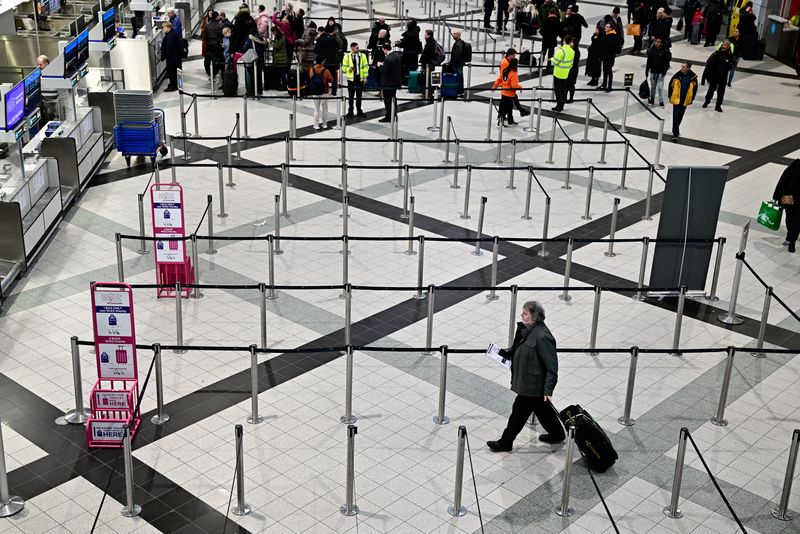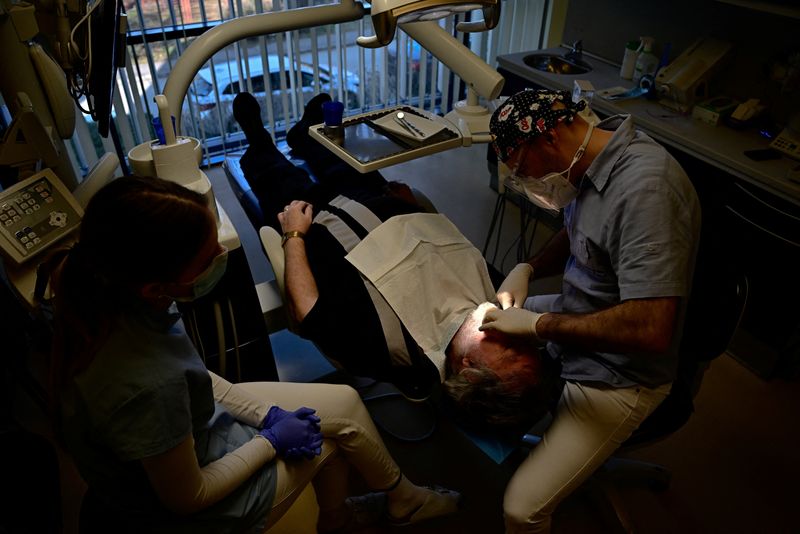By Joanna Plucinska
BUDAPEST (Reuters) - Attila Knott has an empty dental hospital in Hungary.
The foreigners with bad teeth he was counting on never arrived, deterred first by COVID-19 and now by a cost-of-living crisis that has left the medical tourism industry struggling to recover even after the lifting of pandemic travel restrictions.
"People are more cautious," Knott told Reuters, staring at the empty building across the street from his existing Kreativ Dental clinic. "They think twice about spending big money all at once on something like dental treatment."
The businessman had aimed to open the new facility in March 2020 to serve more patients seeking procedures in Hungary for a cheaper price than at home.
Now, with patient numbers having halved from around 600 a month before COVID struck, he is thinking of branching out into colonoscopies and knee replacements.
For years, travelling abroad to clinics in countries like Hungary and Turkey has been an option for British and North American patients who face long waits, high costs or both for dental and medical procedures at home.
Operators had hoped for a rapid bounce back after curbs on travel were lifted.
But inflation fuelled by soaring energy and food prices since the Ukraine war started a year ago has left people with little money to spare, especially for cosmetic procedures.
In Hungary, which borders Ukraine, the war itself is making foreigners wary, Knott said.
Rising air fares and fewer flights - and the memory of last summer's travel chaos - are also putting off would-be patients, clinic operators and analysts told Reuters.
For some trips, like those to Turkey, airline tickets can be twice what they were in 2019, according to WeCure, which specialises in medical tourism to large hubs like Turkey from countries like Britain.
WeCure said flights, ground transfers and petrol now accounted for about 15% of the cost of its travel and treatment packages, roughly double their proportion pre-COVID, putting upward pressure on overall prices.
Some clinics, facing their own higher costs, have hiked charges. A hip or knee replacement at Nordorthopaedics in Lithuania is about 15% more expensive now than five years ago, the clinic told Reuters.
"There will be some trade-offs (for customers)," WeCure's CEO Emre Atceken said. "Instead of having a hair transplant. I'd rather pay my gas bills. I would rather pay my electric bills,"
PROCEDURES ON CREDIT
To encourage clients, some clinic operators are offering pay-as-you-go options, while crowdfunding has sprung up as another source of support.
Atceken said WeCure is offering some customers payment in instalments to stretch out the cost.
Lyfboat, an Indian company providing medical services for foreign patients, told Reuters it has collaborated with a fundraising platform called ImpactGuru to help patients pay for essential surgeries.
Some operators are targeting patients from Britain and Canada, where strained public healthcare services can mean long delays.
Knott said most of his patients are from Britain and Iceland, while fewer are coming from other Nordic countries and France.
Linda Frohock, 73, from Staffordshire, said she delayed retirement, took out a bank loan and used savings to travel to Budapest for dental implants.
She paid 8,000 pounds instead of the estimated 32,000 pounds the procedure would have cost in Britain.
"If it's an emergency and only here could do it, then I wanted them to do it. Somehow you just have to find what you need," she said.
ACUTE VS ELECTIVE
The International Medical Travel Journal, published by market intelligence service LaingBuisson, estimates the medical tourism market is currently worth around $21 billion, less than pre-pandemic, although editor Keith Pollard warned data is poor.
With about 7 million medical travellers a year the IMTJ sees annual growth of 5%-10% as realistic - far less than some projections.
Laszlo Puczko, who runs Budapest-based Health Tourism Worldwide, said clinics specialising in urgent procedures would weather the economic climate as even customers feeling the financial pinch will pay. But those that have competed on price for elective treatments like rhinoplasty will find it harder to survive, he and others said.
"An orthopaedic surgery is something that you cannot postpone if you have severe arthritis and you cannot walk. It's a major, life-changing surgery," said Vilius Sketrys, who runs sales and marketing at Nordorthopaedics.
Bob Martin, 71, decided to pay around 18,000 pounds for new dental implants at Kreativ. A retired NHS nurse manager from Britain, Martin's adult teeth never came through and he has struggled for much of his life with dentures.
"If I need to get the work done, what choice have I got?" he said.

Patients who need vital dental work done will press ahead whatever the cost, said Knott at Kreativ.
"These people usually don't negotiate. They sign whatever we put in front of their nose."
